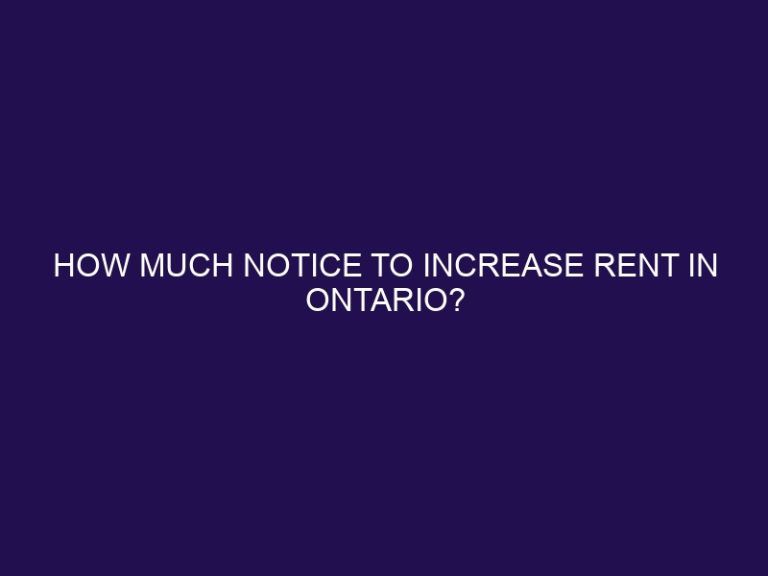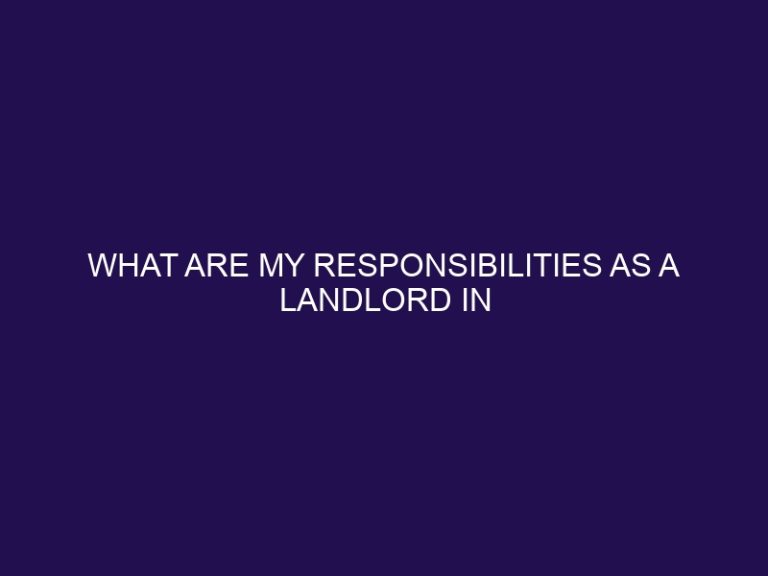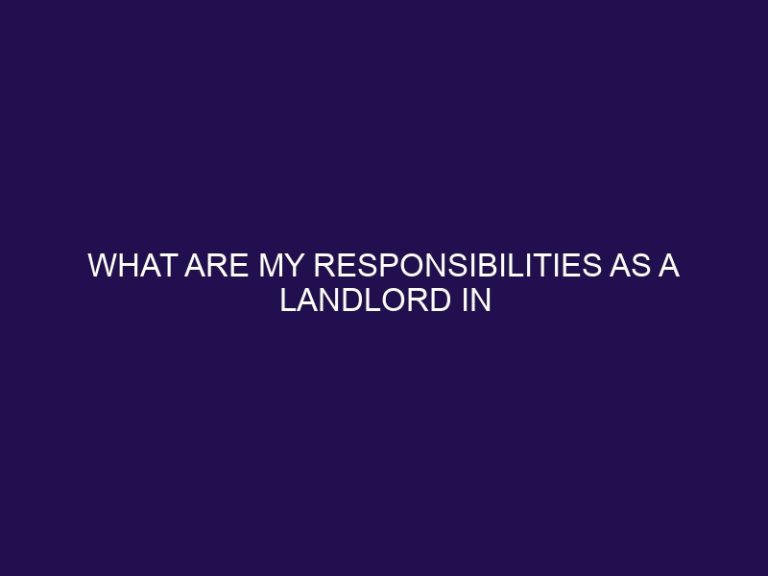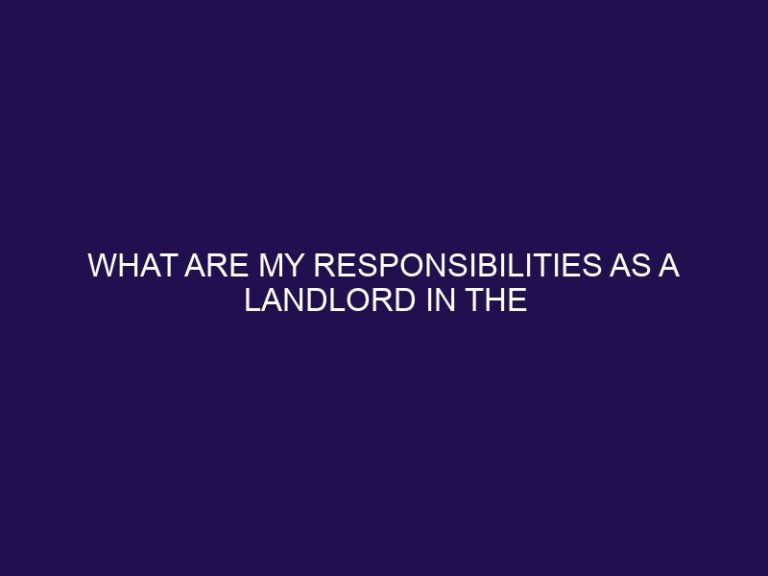How much can I increase rent in Quebec?
.jpg)
Rent increases can be a complex topic, especially when it comes to understanding the laws and regulations specific to a particular region. In the case of Quebec, there are specific guidelines that landlords must adhere to when considering rent increases. Understanding these laws is essential to ensure compliance and maintain a positive landlord-tenant relationship. Here is an overview of the main points to consider regarding rent increase laws in Quebec.
In Quebec, there are limits on how much rent can be increased. These limits are determined by the Regie du logement, the government agency responsible for overseeing residential rentals in the province. The maximum annual rent increase percentage allowed is set each year and may vary.
Before considering any rent increase, landlords must take into account several factors. Firstly, they should consider current market conditions, such as the demand for rental properties and the average rental rates in the area. landlords should consider any maintenance and repair costs they may have incurred. Lastly, it is important to be aware of the tenant protections and rights in Quebec to ensure that any rent increase is reasonable and fair.
To increase rent in Quebec, landlords must follow a specific set of steps. These include reviewing the lease agreement to ensure it allows for rent increases, providing written notice to tenants in advance, calculating the appropriate rent increase based on the guidelines set by the Regie du logement, and submitting the rent increase notice to the agency for approval.
Alternatively, landlords may consider alternatives to rent increases. These may include offering lease renewal incentives to encourage tenants to stay, negotiating with tenants to find a mutually agreeable solution, or adding value to the rental property through improvements or additional amenities.
It is crucial for landlords in Quebec to familiarize themselves with the specific regulations and guidelines relating to rent increases to ensure compliance while maintaining positive landlord-tenant relationships. Consulting the Regie du logement or seeking legal advice can provide further guidance and clarification on this matter.
Key takeaways:
- There is a limit on how much rent can be increased in Quebec: The maximum annual rent increase percentage allowed is set by the government to protect tenants from excessive rent hikes.
- Factors to consider before increasing rent: Landlords should consider current market conditions, maintenance and repair costs, and tenant protections and rights before deciding to raise the rent.
- Steps to increase rent in Quebec: Landlords must review the lease agreement, provide written notice, calculate the appropriate rent increase, and submit the rent increase notice to the Régie du logement according to the legal requirements.
Rent Increase Laws in Quebec
Rent Increase Laws in Quebec protect tenants from excessive rent hikes. According to the Régie du logement, landlords can raise the rent annually, but the increase percentage is determined by the provincial government. In 2021, the maximum allowed increase is 0.7%. Exceptions apply for certain renovation costs or if the landlord hasn’t raised the rent in the past 24 months. These laws ensure that tenants are not faced with sudden, unaffordable increases and help maintain housing affordability in Quebec.
True story: A friend of mine rented an apartment in Quebec and was relieved to discover that her landlord abided by the Rent Increase Laws in Quebec. This allowed her to budget effectively and avoid any financial strain caused by unexpected rent hikes.
Is There a Limit on How Much Rent can be Increased in Quebec?
Is There a Limit on How Much Rent can be Increased in Quebec?
In Quebec, there are laws in place that limit how much rent can be increased. Landlords cannot simply raise the rent to any amount they want. Instead, there are guidelines in place to ensure fairness and protect tenants. The maximum annual rent increase percentage allowed is determined by the Régie du logement in Quebec, which takes into account factors such as the consumer price index and the vacancy rate. These rules apply to most rental units, but there are exceptions for certain types of housing. By following these guidelines, landlords can ensure they are within the legal limits when increasing rent in Quebec.
What is the Maximum Annual Rent Increase Percentage Allowed?
In Quebec, landlords are required to adhere to a maximum annual rent increase percentage set by the government. This percentage is determined each year, taking into account factors such as the consumer price index and the average increase in landlords’ expenses. To ensure compliance with the regulations and guidelines provided by the Régie du logement, landlords need to regularly check the current rules. By doing so, landlords can avoid any legal issues and guarantee a fair and reasonable increase in rent for their tenants.
Are There any Exceptions to the Rent Increase Rules in Quebec?
In Quebec, there are a few exceptions to the rent increase rules. Are There any Exceptions to the Rent Increase Rules in Quebec? One exception is if the rental property undergoes major renovations or improvements that significantly increase its value. In such cases, landlords may be able to apply for a rent increase above the usual limits with the approval of the Régie du logement. Another exception is if the tenant agrees to a rent increase outside of the regular guidelines. This agreement must be made voluntarily and in writing. It’s important to note that landlords cannot increase rent for discriminatory reasons or in retaliation against a tenant exercising their rights.
In a similar vein, I once knew a landlord in Quebec who had a long-standing tenant who took excellent care of the property. After several years of the same rent, the landlord decided to invest in some major upgrades to the apartment. They approached the tenant and discussed the potential rent increase, explaining the improvements being made and the impact on the property’s value. The tenant understood and agreed to a slightly higher rent, appreciating the improved living conditions. This was a mutually beneficial arrangement that followed the rules and respected the tenant’s rights.
Factors to Consider before Increasing Rent
When it comes to increasing rent in Quebec, there are important factors that landlords need to consider. In this section, we will explore these factors and their implications. We’ll take a closer look at the current market conditions, maintenance and repair costs, as well as tenant protections and rights. By understanding these key elements, landlords can make informed decisions about rent increases that are fair and reasonable for both parties involved.
Current Market Conditions
When considering increasing rent in Quebec, it’s essential to take into account the current market conditions. This includes factors such as the demand for rental properties, vacancy rates, and rental prices in the area. Assessing the current market conditions is key in determining whether a rent increase is appropriate and will be well-received by tenants. If the market is competitive and there is high demand for rentals, it may be more feasible to increase rent. Conversely, if the market is saturated or rental prices are already high, it may be wise to hold off on raising the rent.
Maintenance and Repair Costs
Maintenance and repair costs are important factors to consider when determining rent increases in Quebec. Landlords need to ensure that rental properties are well-maintained and in good condition, which incurs expenses. These costs can include routine maintenance, repairs, renovations, and upgrades to keep the property safe and functional for tenants. Landlords may need to account for increases in the cost of materials, labor, and professional services related to maintenance and repairs. By considering these costs and their impact on the overall expenses of managing a rental property, landlords can determine fair and reasonable rent increases that align with the market and the condition of the property.
| Maintenance and Repair Costs | |
| Expense | Amount |
| Routine maintenance | $500 per year |
| Repairs | $1,000 per year |
| Renovations | $2,000 every 5 years |
| Upgrades | $500 per year |
| Total | $3,000 per year |
Tenant Protections and Rights
Tenant Protections and Rights are of utmost importance when it comes to the process of rent increase in Quebec. These laws play a crucial role in ensuring fair treatment for tenants and preventing arbitrary or excessive rent hikes. In accordance with these regulations, landlords are required to adhere to specific procedures and provide written notice to tenants when proposing a rent increase. It is essential to note that tenants have the right to dispute unjustified increases by filing a complaint with the Régie du logement, thereby safeguarding their rights. By maintaining a balanced and respectful relationship between landlords and tenants, these Tenant Protections and Rights ensure that rent increases are reasonable and within legal limits.
Steps to Increase Rent in Quebec
Thinking about increasing rent in Quebec? In this section, we’ll dive into the step-by-step process to help you navigate through it smoothly. From reviewing the lease agreement to calculating the appropriate rent increase, and finally submitting the rent increase notice to the Régie du logement, we’ve got you covered. Let’s explore the essential steps and requirements involved in increasing rent in Quebec.
Review the Lease Agreement
To ensure a smooth rent increase process in Quebec, it is crucial to review the lease agreement. Below are the necessary steps to follow:
- It is essential to thoroughly review the lease agreement in order to understand the terms and conditions.
- Particular attention should be given to any clauses or provisions related to rent increases.
- Take note of the expiration date of the current lease.
- Examine the terms regarding notice periods for rent increases.
- Additionally, consider any specific requirements or restrictions mentioned in the lease.
- If there are any doubts or further clarification needed, it is highly recommended to consult a legal professional.
Provide Written Notice
When increasing rent in Quebec, it is imperative to provide tenants with a written notice. This written notice must include the proposed increase amount, effective date, and the reason for the increase. It is essential to deliver the notice in person, by registered mail, or by a bailiff to ensure compliance with the legal requirements. Providing this written notice is of utmost importance as it serves as concrete proof that the landlord has fulfilled their obligation to inform the tenant about the upcoming rent increase. Failure to provide written notice would render any rent increase invalid under Quebec’s rental laws.
In a similar situation, Jean, a landlord in Quebec, had to raise the rent for his apartment building due to escalating maintenance costs. Jean followed the appropriate procedure and provided his tenants with a written notice, clearly explaining the reasons behind the increase. Throughout the process, Jean maintained open communication with his tenants, addressing any concerns they may have had. This proactive and transparent approach not only helped sustain a positive landlord-tenant relationship but also ensured a seamless transition and understanding between both parties.
Calculate the Appropriate Rent Increase
- Review the lease agreement to understand any provisions or restrictions related to rent increases.
- Provide written notice to the tenant, clearly stating the intention to increase the rent and the effective date of the increase.
- Calculate the appropriate rent increase by considering factors such as the maximum annual percentage allowed and current market conditions.
- Submit the rent increase notice to the Régie du logement, the government agency responsible for overseeing landlord-tenant issues.
By following these steps, landlords can ensure that they are adhering to the regulations and guidelines set forth in Quebec’s rent increase laws.
Submit the Rent Increase Notice to the Régie du logement
- Review the lease agreement to understand the terms and conditions regarding rent increases.
- Provide written notice to the tenant, stating the intention to increase the rent and the amount of the increase.
- Calculate the appropriate rent increase based on the guidelines provided by the Régie du logement.
- Submit the Rent Increase Notice to the Régie du logement, including all required information and documentation.
By following these steps, landlords can ensure that they are in compliance with the regulations and procedures set forth by the Régie du logement when increasing rent in Quebec.
Alternatives to Rent Increases in Quebec
In the quest to explore alternatives to rent increases in Quebec, we dive into the dynamic realm of finding creative solutions. From offering lease renewal incentives to negotiating with tenants and adding value to the rental property, we uncover strategies that go beyond the conventional approach. So, buckle up and join us as we unravel a world of possibilities that can enhance tenant satisfaction while maximizing your rental income.
Offering Lease Renewal Incentives
Offering lease renewal incentives is a strategy that landlords can use to encourage tenants to renew their leases. By providing benefits or rewards, landlords can create a mutually beneficial situation for both parties.
- Discounted Rent: Landlords can offer a reduced rent rate for tenants who choose to renew their leases, providing an incentive for them to stay.
- Upgraded Amenities: Landlords can upgrade amenities in the rental property, such as installing new appliances or improving common areas, to entice tenants to renew their leases.
- Favorable Lease Terms: Landlords can offer more favorable lease terms, such as a longer lease period or increased flexibility, to encourage tenants to stay.
- Rewards Program: Landlords can implement a rewards program where tenants earn points or incentives for renewing their leases, such as gift cards or rent discounts.
Negotiating with Tenants
Negotiating with tenants is a crucial aspect of increasing rent in Quebec. When it comes to discussing rent increases with tenants, here are a few strategies worth considering:
Promote open communication: Initiate a conversation with your tenant to discuss the proposed rent increase and the underlying reasons for it.
Explain the current market conditions: Provide information about the existing rental market trends and illustrate how the suggested increase aligns with these conditions.
Offer attractive incentives: Consider providing lease renewal incentives, such as a temporary rent freeze or waived fees, to entice the tenant into accepting the increase.
Show flexibility: Be ready to negotiate and find a mutually agreeable solution that takes into account the tenant’s circumstances and financial capabilities.
Showcase added value: Highlight any property improvements or additions that enhance its value, which can help justify a rent increase.
Note: Do not add any new lines in the text.
When it comes to discussing rent increases with tenants, here are a few strategies worth considering:
| Promote open communication: | Initiate a conversation with your tenant to discuss the proposed rent increase and the underlying reasons for it. |
| Explain the current market conditions: | Provide information about the existing rental market trends and illustrate how the suggested increase aligns with these conditions. |
| Offer attractive incentives: | Consider providing lease renewal incentives, such as a temporary rent freeze or waived fees, to entice the tenant into accepting the increase. |
| Show flexibility: | Be ready to negotiate and find a mutually agreeable solution that takes into account the tenant’s circumstances and financial capabilities. |
| Showcase added value: | Highlight any property improvements or additions that enhance its value, which can help justify a rent increase. |
Adding Value to the Rental Property
Adding value to a rental property can attract higher-quality tenants and justify higher rental rates. Here are some ways to enhance the value of your rental property:
- Renovations: Upgrading the kitchen, bathroom, or flooring can significantly increase the property’s appeal and add value to the rental property.
- Amenities: Incorporating amenities like a gym, pool, or outdoor space can make the property more attractive to potential tenants, thereby adding value to the rental property.
- Energy efficiency: By installing energy-efficient appliances and improving insulation, you can not only save tenants money on utilities but also make the rental property more environmentally-friendly and increase its value.
- Security: Enhancing the security features of the rental property, such as installing a security system or improving lighting, can make tenants feel safer and add value to the property.
- Maintenance: Regular maintenance and repairs ensure that the rental property stays in good condition, reducing the risk of costly issues in the future and adding value to the property.
A landlord in Quebec took the initiative to add value to his rental property by updating the kitchen and bathrooms with modern fixtures and finishes. As a result, he successfully increased the rent by 25% and attracted high-quality, long-term tenants who not only appreciated the upgraded features but also were willing to pay a premium for the improved living space. This exemplifies how adding value to the rental property can lead to positive outcomes.
Some Facts About How Much Can I Increase Rent in Quebec:
- ✅ Quebec’s housing tribunal has recommended rent increases for 2023. (Source: montreal.citynews.ca)
- ✅ The minimum recommended rent increase for leases without heating is 2.3%. (Source: montreal.citynews.ca)
- ✅ Rent increases of 2.8% are recommended for leases with electric heating. (Source: montreal.citynews.ca)
- ✅ Leases with gas heating have a recommended increase of 4.5%. (Source: montreal.citynews.ca)
- ✅ Heating oil systems have the highest recommended increase at 7.3%. (Source: montreal.citynews.ca)
Frequently Asked Questions
1. Can landlords in Quebec increase rent by any amount they want?
No, landlords in Quebec cannot increase rent by any amount they want. Rent increases must follow the guidelines set by the Tribunal administratif du logement and the Regulation respecting the criteria for the fixing of rent.
2. How are rent increases calculated in Quebec?
Rent increases in Quebec are calculated based on the expenses of the building. The lessor must provide revenue and expense information to the Tribunal administratif du logement, who then determines the allowable increase using the Rent Increase Calculation Tool.
3. Is there a limit to how much rent can be increased in Quebec?
Yes, there is a limit to how much rent can be increased in Quebec. The rent increase recommendations for 2023 include a minimum increase of 2.3% for leases without heating, 2.8% for electric heating, 4.5% for gas heating, and 7.3% for heating oil systems. These recommendations are based on landlords’ expenses for a specific dwelling.
4. Can tenants refuse a rent increase in Quebec?
Yes, tenants in Quebec have the right to refuse a rent increase. After receiving a notice to renew the lease with a rent increase, tenants have one month to accept or refuse the increase. If the tenant refuses, the lessor must file an Application to modify the lease with the Tribunal administratif du logement.
5. Are there time limits for landlords to request rent increases in Quebec?
Yes, there are specific time limits for landlords to request rent increases in Quebec. If an agreement cannot be reached with the tenant, the lessor must file an Application to modify the lease with the Tribunal administratif du logement within one month of the tenant’s refusal.
6. Is there rent control in Quebec?
Currently, there is no universal rent control in Quebec. However, there are recommendations and guidelines set by the Tribunal administratif du logement to regulate rent increases and protect tenants from excessive increases. Some housing committees and tenants associations are advocating for government action to implement rent control to address the housing crisis and make housing more affordable.







